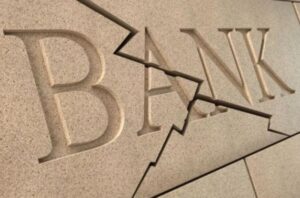
The crisis in the U.S. banking industry has led to a bubble in the segment of money market funds, writes MarketWatch referring to the report of Bank of America Corp.
According to analysts at the bank, over the past four weeks, assets under management of money market funds have grown by $300 billion – more than $5.1 trillion.
In addition, the bank’s experts point to the largest weekly inflows in money market investments since March 2020, the largest six-week inflows in US Treasuries in history and the largest outflows from the investment grade bond market since October 2022.
There was a surge in assets under money market funds in 2008 and 2020. However, at that time, the U.S. Federal Reserve (Fed) was lowering interest rates, not raising them. On March 22, the U.S. regulator reportedly raised the federal funds rate by 25 basis points.
“The stock and bond markets want too much of a rate cut and not enough of a recession,” BofA analysts said.

More and more investors are pessimistic about the prospects for the global economy and corporate profits, according to the results of a monthly survey of fund managers conducted by Bank of America Corp. (BofA).
According to the results of the July survey, the proportion of respondents who expect the economy to weaken in the next 12 months reached a record 79%, an increase of 6 percentage points (p.p.). The share of investors expecting corporate earnings to worsen over the next 12 months rose by 7 percentage points, also reaching 79%.
Stagflation in the global economy is expected by a record 90% of respondents compared to 83% a month earlier.
The survey, which included 259 investors managing $722 billion in assets, was conducted by BofA last week.
Investors have reduced exposure to risky assets to lows not seen even during the global financial crisis, “completely capitulating” in the face of a bleak economic outlook, BofA said.
The share of stocks in investment portfolios this month fell to the lowest since the collapse of investment bank Lehman Brothers in 2008, the share of cash balances reached 6.1%, the highest since October 2001.
Among the biggest risks, fund managers point to high inflation, a global recession, and a hawkish central bank.
At the same time, the proportion of respondents who expect inflation to slow down next year has reached its highest level since the global financial crisis.
BofA has been conducting surveys of fund managers since 1994.

Ukraine may try to refuse cooperation with the International Monetary Fund (IMF) during the electoral cycle 2023-2024, analysts at Bank of America (BofA) believe.
According to the BofA Global Research report, which is owned by Interfax-Ukraine, analysts believe that it may be extended to 2022 “given limited progress.”
“However, we also think that the Ukrainian authorities may try to ‘graduate’ from reliance on IMF financing during the next electoral cycle in the second half of 2023 – the first quarter of 2024,” the analysts said in the report.
According to the report, the authorities may be open to the idea of a new program after the elections as part of broader cooperation with the West, but may prefer not to be bound by IMF conditionality and the usual implementation problems during the electoral campaign.
According to BofA, this may lead to a period without an active IMF program, although some form of cooperation will likely remain in place in any scenario.
The next Verkhovna Rada elections are planned for October 2023, followed by presidential elections in March 2024. This leaves 2022 as the remaining window for continued close cooperation with the IMF, BofA believes.
“We think the extension of the current SBA program [under the stand-by arrangements] for another year or so is the most likely scenario. The extension may allow Ukraine to roll over at least part of its nearly $3 billion in maturities to the IMF in 2021-2022,” BofA said in the report.
Ukraine’s ability to withhold official funding is likely to directly depend on fiscal consolidation in 2022-2023.
At the same time, as noted by BofA, a flexible approach to fiscal policy is likely to mean the need for IMF financing even during the electoral cycle.
Although Ukraine must fulfill a number of conditions in the current program of the Fund, analysts still believe that Ukraine will be able to pass the first test and receive the first tranche in July-September 2021.

Analysts at Bank of America (BofA) Global Research do not expect further nominal strengthening of the hryvnia, according to a June 14 BofA study.
The bank said that it is still constructive in relation to the International Monetary Fund (IMF), but the bank does not expect further nominal strengthening of the hryvnia, especially given the seasonality of the exchange rate in the third quarter, BofA said.

Analysts at BofA Securities, which expected the Ukrainian economy to fall by 6.8% in 2020, lowered their forecast to 5.2%, while the forecast for the country’s economic recovery in 2021 fell to 4.5% versus the previous forecast of 6.5%.
The weaker-than-expected economic downturn in 2020 also diminishes the base effect for a 2021 recovery, despite the current strong momentum for a recovery in consumer demand, as well as a record low borrowing cost since the 2020 easing cycle, BofA Securities said in a review issued on November 24.
A sustained recovery in consumer activity amid an extremely strong base effect could push inflation above the 5% ± 1 pp target range in the second-third quarters of 2021, which, according to analysts, could force the NBU to raise the key policy rate by about 100 bp in the second half of the coming year.
At the same time, it is predicted that the key policy rate may return to a decline in 2022, as soon as inflationary pressures stabilize.
According to the analysts, in 2021, Ukraine is likely to receive another one or two tranches under the IMF program, including the deferred tranche of 2020. An important condition for them is the restoration and stabilization of anti-corruption institutions, including a possible complete reshuffle in the Constitutional Court, which may take several more months.
According to the review, the attractive yield on Ukrainian government bonds is noted, while the exchange rate remains the main problem for offshore investors.
The analysts said that Ukraine has decent upside potential, dependent on the hryvnia, which is now largely undervalued, but they noted that domestic politics remains a key risk.